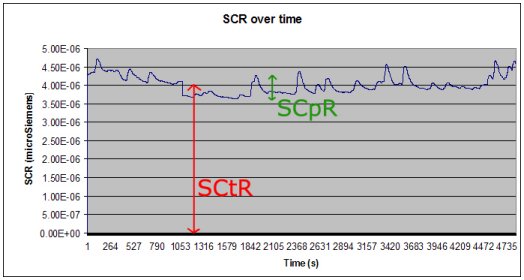|
For each of the 6 scenarii, 4 measures were taken:
- score on the scenario; - maximum score possible for the scenario; - time delays to respond to the IM (except in the scenario with no IM); - skin conductivity. The ratio of the first two gave the task performance. Time delays were averaged to give an average time response for each scenario. Even if the questions were of variable difficulty, the proportion and occurence of easy and more difficult were conserved during the different scenarii. This measure can therefore be interpreted as a global amount of time allocated to the task of responding to the IM. Maybe a better way to quantify time response would be to average time delays over the 4 or 5 most difficult questions. From the skin conductivity response, two values were quantified for each scenario: - SCtR: skin conductivity tonic response (which corresponds to the overall, global level of conductivity, typically from 0 to 10 microSiemens); - SCpR: skin conductivity phasic response (which corresponds to the fast variating responses to particular events, ranging from 0 to 0.1 microSiemens). In this experiment, SCpR was averaged among all the particular distinctive responses. In the scenarii with no IM, SCpR corresponded to the influence of the game and its particular events; whereas it corresponded to the impact of the game and of the incoming IM in the scenarii with IM. Following are shown the measures taken: SCR: overall signal. SCtR: tonic component. SCpR: phasic component.  SCR is shown here in microSiemens. Nevertheless, in order to perform the statistical analysis, the direct output of the GSR measurement device was used. It is given by the linear relation: GSR_output = 6.55x108 x Skin_Conductance. |
mas.630
affective computing
16.422
human supervisory control
mas.630
affective computing
16.422
human supervisory control